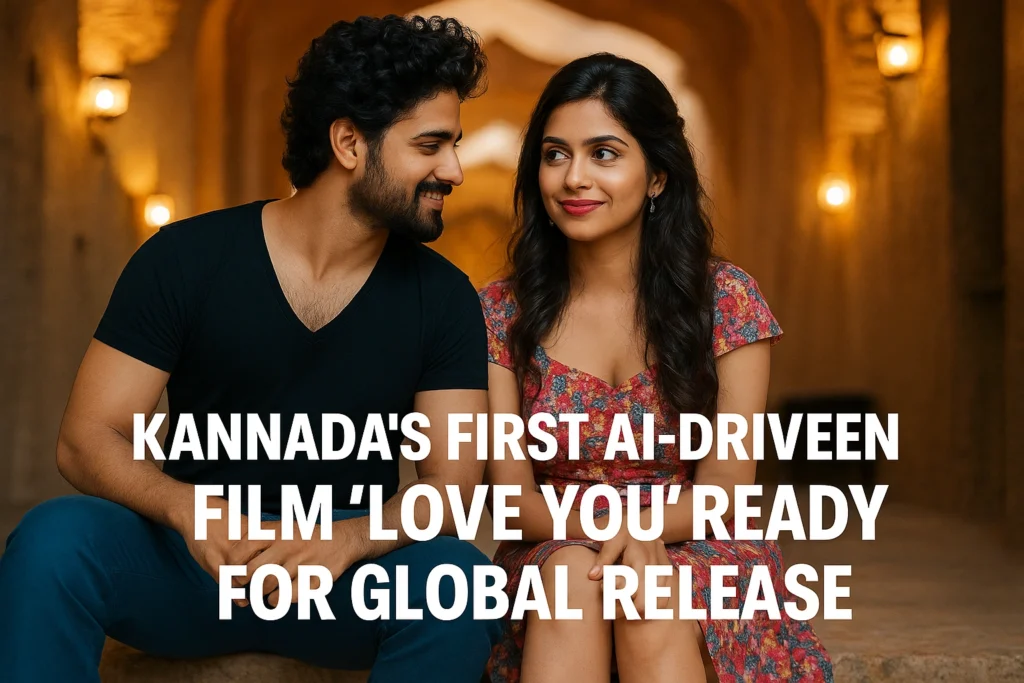Imagine settling into a dark theatre, expecting human actors and elaborate crews, only to discover that every frame, line, and musical note was generated by artificial intelligence. That’s precisely the experience awaiting audiences with “Love You”, hailed as both Karnataka’s and the world’s first fully AI-generated feature film . Clocking in at 95 minutes, this romantic drama is more than a novelty—it’s a bold experiment in storytelling that could reshape how movies are made.
Behind the Camera: A Passionate Creator
At the heart of “Love You” is S. Narasimha Murthy, a priest at Bengaluru’s Bagalagunte Anjaneya Temple who has quietly nurtured his passion for filmmaking. Murthy not only directed but also produced the entire film, guiding the AI’s creative decisions with a filmmaker’s intuition. “I wanted to show that technology can carry the emotional weight of a love story,” he explains, calling “Love You” a “digital marvel”.
The Technical Maestro: Nutan
Partnering with Murthy is AI specialist Nutan, an LLB graduate with over a decade’s experience in Sandalwood as an editor and assistant director. Nutan oversaw the deployment of roughly 20 to 30 AI tools—ranging from Runway ML to Kling AI and Minimax—to generate visuals, design characters, and compose music. His role was akin to a conductor, orchestrating disparate algorithms into a cohesive cinematic symphony.
Lean Budget, Big Ambitions
Remarkably, “Love You” was produced on a shoestring budget of just ₹10 lakh and wrapped in six months—timeframes that would be inconceivable for traditional productions of this scale. Yet this frugality posed its own challenges: ensuring character continuity, fine‑tuning emotional expressions, and maintaining narrative flow required constant human oversight to guide the AI’s creativity and correct any glitches.
🎬 World's first fully AI-generated movie… and it's from Kannada cinema! 💥
— BengaluruPost (@bengalurupost1) April 16, 2025
Titled Love You, this film is made entirely using AI — script, visuals, music & more.
Only the director & producer are human. Everything else? 100% AI.
A global first. A Kannada first. 🇮🇳✨🧡❤️… pic.twitter.com/NzIZ8xbo7L
Song Soundtrack from Silicon
Music lovers will be intrigued to learn that the film’s entire soundtrack—12 original songs along with background scores—was AI‑composed. From romantic ballads to upbeat montages, each track was synthesized, arranged, and mixed by algorithms trained on decades of musical styles. The result? A surprisingly cohesive score that underlines key emotional beats without a single live musician on set.
Official Seal of Approval for film
Breaking new ground, “Love You” secured a U/A certificate from India’s Central Board of Film Certification, becoming the first AI‑made movie to clear this hurdle. The CBFC’s approval confirms the film’s thematic maturity and technical competence, effectively green‑lighting AI‑driven content for mainstream audiences.
Global Premiere Release of Film Love You
After its domestic certification, “Love You” is slated for a global theatrical release in early May 2025, marking a milestone for Indian cinema on the world stage. Distribution partners in North America and Europe are already in talks, eyeing film festivals and art‑house circuits keen on showcasing innovative storytelling.
“Thrilled to announce #LoveYouFilm is all set for its worldwide premiere! AI met human emotion, and the result is magical. Can’t wait for you to experience it.”
Tweet from @NaraFilms
What It Means for Filmmaking AI
“Love You” isn’t here to replace directors or actors—it’s a proof of concept. By shouldering routine tasks—storyboarding, character design, even dialogue generation—AI can free creatives to focus on vision, emotion, and nuance. For indie filmmakers, low budgets, and tight schedules, these tools could democratize cinema, making it possible to tell stories once out of reach.
Conclusion of Kannada film Love You
As AI tools grow smarter, we’ll likely see more hybrid projects: human‑AI collaborations where technology augments rather than automates artistry. Whether “Love You” heralds a new era or remains a fascinating one‑off, it undeniably sparks crucial conversations about authorship, creativity, and the future of cinema.
